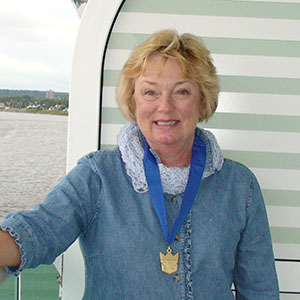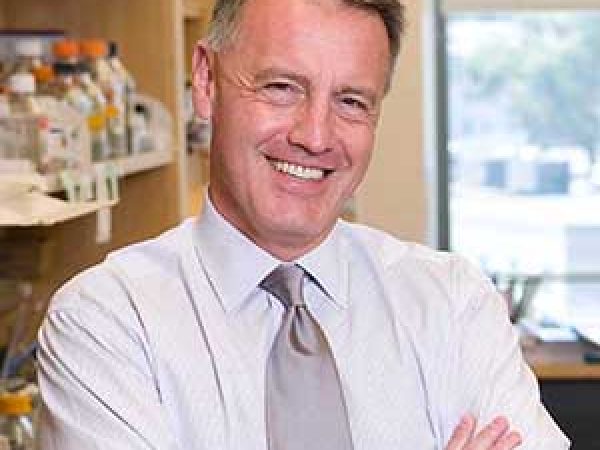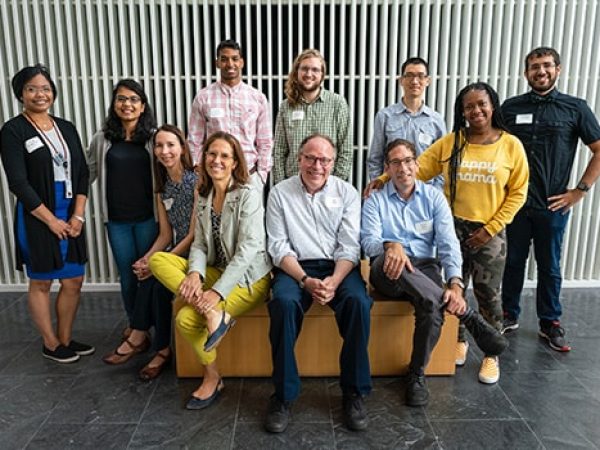How Does One Become a Cancer Advocate?
Guest Post by Sammantha McDonald
Past participant in the AACR’s Scientist↔Survivor Program (SSP)
When you hear the words “I’m sorry, but you have cancer,” your world starts to crumble around you. You no longer hear any other words; you can’t see anything around you; there is a buzz in your head that you cannot eliminate. Your life suddenly changes and you begin to live a “new normal.”
While I was still recovering at home two weeks after my mastectomy, I received a call from a friend asking me to call a mutual friend who was just diagnosed with breast cancer. I made the call, pretty sure there was nothing I could do to help. But after an hour and a half on the phone with her, sharing my experience and the research I had done after my diagnosis and before my surgery, I realized that this was what I was supposed to do – help others who are faced with a breast cancer diagnosis.
My diagnosis came nearly 20 years ago. The internet was still young; “Dr. Susan Love’s Breast Book” was just about the best resource out there. I sought out others who had been through the same thing and found most women wanted to talk about it, but in hushed tones, as if their cancer was a secret.
My decision to not speak in hushed tones about my journey was my new normal. I was very public about my diagnosis and talked to anyone who would listen about the importance of early detection. My breast cancer was discovered via a mammogram at age 46. I was premenopausal, which made me a “young” diagnosee. I felt it was up to me to stand on the soapbox and talk about self-exams, mammograms, and yearly exams by a medical professional. I didn’t know at the time that there were others trying to speak as loudly as me.
I got involved with the American Cancer Society and Susan G. Komen for the Cure. They offered me training in public policy so that I could talk to our elected officials about raising more money for cancer research. I found a road to research advocacy through Komen via its Advocates in Science program, becoming a peer reviewer and learning about the science behind cancer. I became better educated by attending programs like the National Breast Cancer Coalition’s Project LEAD® Institute. I also attended conferences like the American Society of Clinical Oncology’s (ASCO) Breast Cancer Symposium.
I also had the good fortune of being selected to participate in the American Association of Cancer Researcher’s (AACR) Scientist↔Survivor Program, a program that unifies all cancer advocates in the fight against cancer research. The program, which is held during the AACR Annual Meeting and the AACR Conference on the Science of Cancer Health Disparities, provides advocates with special lectures using lay language, small group discussions, scientific sessions that present the latest findings in cancer research, and other opportunities for the exchange of information on key aspects of cancer research, survivorship, advocacy, and public policy. After the program, I found myself talking about cancer in more general terms, rather than just focusing on breast cancer. This was a huge step for me in advancing my education. AACR provided me the opportunity to learn about cancer alongside other advocates who had walked in my shoes, but had taken a different road. Working with experienced mentors and scientists made me want to learn even more, not just to become better educated, but to also take in a little of their experiences, too. It made my voice a bit stronger and more confident when advocating for others.
I still make phone calls to breast cancer patients who are newly diagnosed, although my firsthand experience was nearly 20 years ago. I marvel at the changes in cancer treatment these days. Working with the newly diagnosed keeps me educated and up-to-date. Until we find the causes and the cures, I will continue my advocacy work. Most of all, I do this so that my daughter and my granddaughter might not have to be concerned about this type of cancer diagnosis.
Sammantha McDonald is a past participant in the AACR’s Scientist↔Survivor Program (SSP). The SSP is designed to build enduring partnerships between leaders of the scientific and cancer advocacy communities. The program is held at various AACR scientific meetings and provides advocates with special lectures using lay language, small group discussions, and other opportunities to exchange information on key aspects of cancer research, survivorship, advocacy, and public policy.




